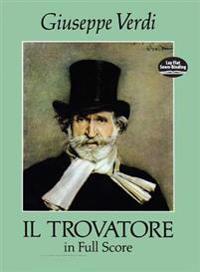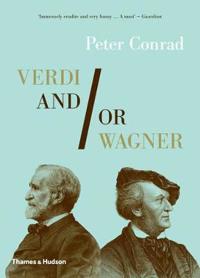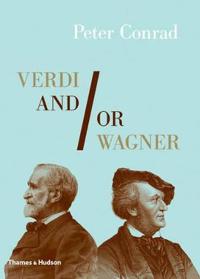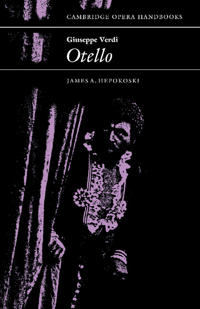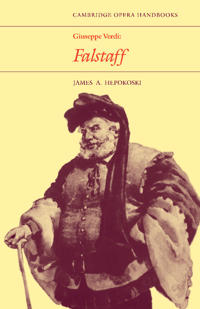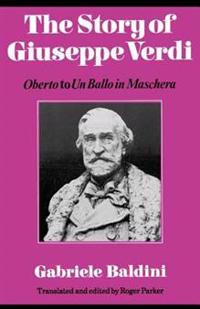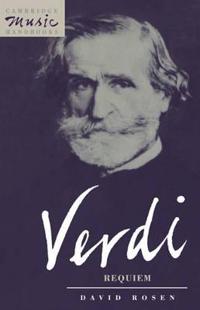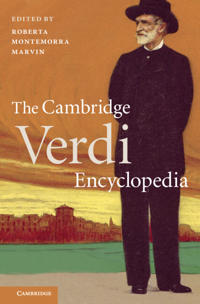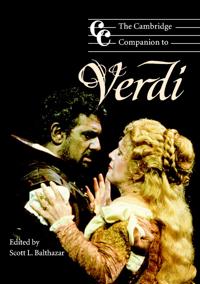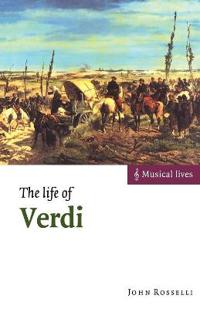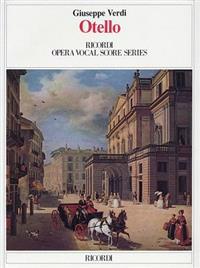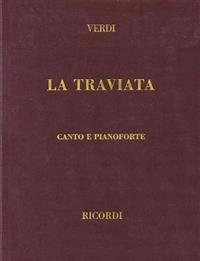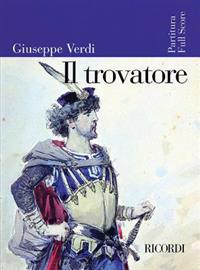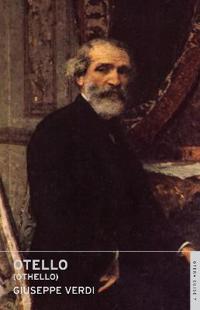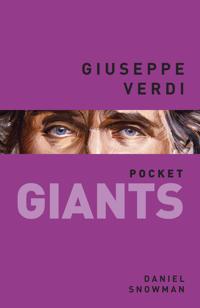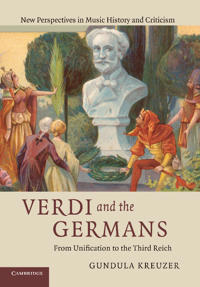Il Trovatore in Full Score (Pocket)
avGiuseppe Verdi
ISBN: 9780486279152 - UTGIVEN: 1994-03First performed in Rome in 1853, "Il Trovatore" is one of Giuseppe Verdi's most successful and most performed operas. Supremely melodic, vigorously paced, it is filled with arias and vocal ensembles of thrilling power. Grand opera at its most stirring, it is above all rich in opportunities for bravu[...]
Verdi and/or Wagner (Häftad)
avPeter Conrad
ISBN: 9780500290859 - UTGIVEN: 201302Giuseppe Verdi and Richard Wagner, the two greatest operatic composers of their time, had everything and nothing in common. Their achievements were comparable, but their personalities, their approaches to music and drama, and their complex legacies made them incompatible. Verdi thought of art as a c[...]
Verdi and/or Wagner (Inbunden)
avPeter Conrad
ISBN: 9780500515938 - UTGIVEN: 201110Giuseppe Verdi and Richard Wagner, the two greatest operatic composers of their time, had everything and nothing in common. Their achievements were comparable, but their personalities, their approaches to music and drama, and their complex legacies made them incompatible. Verdi thought of art as a c[...]
Verdi at the Golden Gate: Opera and San Francisco in the Gold Rush Years (Övrig)
avGeorge Martin
ISBN: 9780520081239 - UTGIVEN: 1993-08-17Opera is a fragile, complex art, but it flourished extravagantly in San Francisco during the Gold Rush years, a time when daily life in the city was filled with gambling, duels, murder, and suicide. In the history of the United States there has never been a rougher town than Gold Rush San Francisco,[...]
Giuseppe Verdi: Otello (Häftad)
avJames A. Hepokoski
ISBN: 9780521277495 - UTGIVEN: 198706Summarises what is currently known about Otello and interprets its significance within Verdi's career.[...]
Giuseppe Verdi: Falstaff (Häftad)
avJames A. Hepokoski
ISBN: 9780521280167 - UTGIVEN: 198311A compact, up-to-date guide to the history and construction of Verdi's last - and possibly greatest - opera.[...]
The Story of Giuseppe Verdi (Häftad)
avGabriele Baldini
ISBN: 9780521297127 - UTGIVEN: 1980-11Abitare la battaglia, Gabriele Baldini?s study of the operas of Verdi from Oberto to Un ballo in maschera, has, since its posthumous publication in 1970, received much critical acclaim both in Italy and elsewhere. Its lack of technical language makes it easily accessible to the general music lover, [...]
Verdi, Requiem
ISBN: 9780521397674 - UTGIVEN: 1995-06Verdi?s Messa da Requiem is one of the most frequently performed works of the choral repertoire, and one of Verdi?s most important non-operatic works. This new handbook offers an up-to-date account of the work?s genesis, its performance history, and issues regarding performing practice. The central [...]
The Cambridge Verdi Encyclopedia (Inbunden)
ISBN: 9780521519625 - UTGIVEN: 2014-01Verdi's enduring presence on the opera stages of the world and as a subject for study by scholars in various disciplines has placed him as a central figure within modern culture. His operas, including La traviata, Rigoletto and Aida, are among the most frequently performed worldwide and his populari[...]
The Cambridge Companion to Verdi (Häftad)
ISBN: 9780521635356 - UTGIVEN: 2004-11This Companion provides a biographical, theatrical, and social-cultural background for Verdi?s music, examines in detail important general aspects of its style and method of composing, and synthesizes stylistic themes in discussions of representative works. Aspects of Verdi?s milieu, style, creative[...]
The Life of Verdi
ISBN: 9780521669573 - UTGIVEN: 2000-09Verdi's long life spanned Napoleonic rule and the age of broadcasting. He was the last great composer to give direct voice to basic human emotions yet he was not always as straightforward as the directness of his work suggests: he was neither the uneducated peasant he claimed to be nor the conservat[...]
Classic Rock (Häftad)
avVerdi, Hal Leonard Publishing Corporation
ISBN: 9780634054099 - UTGIVEN: 2004-04(Note-for-Note Keyboard Transcriptions). Authentic transcriptions right off the recordings of these 35 all-time rock classics: Beth * Bloody Well Right * Changes * Cold as Ice * Come Sail Away * Don't Do Me like That * Green-Eyed Lady * Hard to Handle * Heaven * Killer Queen * King of Pain * Lady M[...]
Falstaff, Cloth, It/En: Vocal Score (Inbunden)
avGiuseppe Verdi
ISBN: 9780634071706 - UTGIVEN: 1986-11Otello: Vocal Score (Häftad)
avGiuseppe Verdi, Francis Heuffer, Ricordi
ISBN: 9780634072376 - UTGIVEN: 1986-11(Vocal Score). Italian/English. Translated by Heuffer.
Otello: Vocal Score (Inbunden)
avGiuseppe Verdi, Francis Heuffer, Ricordi
ISBN: 9780634072383 - UTGIVEN: 1986-11Il Trovatore, Cloth, It: Vocal Score (Inbunden)
avGiuseppe Verdi
ISBN: 9780634072673 - UTGIVEN: 1986-11Giuseppe Verdi - Il Trovatore: Full Score (Okänt format)
ISBN: 9780634073014 - UTGIVEN: 2003-09(Study Score). This newly released edition of Verdi's masterwork has a beautiful color cover and a plot synopsis in English. Sewn binding.[...]
Aida (Häftad)
avGiuseppe Verdi
ISBN: 9780714544069 - UTGIVEN: 2011-02Aida is, for most of us, the quintessence of Ancient Egypt but it is certainly not just for archaeologists. Michael Rose points out that it is really about patriotism - an issue of burning importance to Verdi and his contemporaries. Music critic William Mann reflects that even a short look at the sc[...]
Otello (Häftad)
avGiuseppe Verdi
ISBN: 9780714544113 - UTGIVEN: 2011-02Winton Dean relates how Otello came into being as much because of the persistence of Verdi's publisher as of the composer's lifelong passion for Shakespeare, and the collaboration of the brilliant poet Arrigo Boito. Benedict Sarnaker argues that this magnificent large-scale opera rivals Shakespeare [...]
Giuseppe Verdi
ISBN: 9780752493251 - UTGIVEN: 2016-06Giuseppe Verdi (1813-1901) was the Shakespeare of opera, the composer of Rigoletto, Il Trovatore, La Traviata, Aida and Otello. The chorus of Hebrew slaves from Nabucco (1842) is regarded in Italy as virtually an alternative national anthem - and the great tragedian rounded off his career fifty year[...]
The Sounds Of Paris In Verdi's La Traviata (Inbunden)
avEmilio Sala
ISBN: 9781107009011 - UTGIVEN: 2013-05-09Emilio Sala uses rare documents and images to re-examine Verdi's La traviata in the cultural context of mid-nineteenth-century Paris.[...]
Verdi, Opera, Women (Inbunden)
avSusan Rutherford
ISBN: 9781107043824 - UTGIVEN: 2013-10-31Susan Rutherford explores Verdi's operas in the context of women's social, cultural and political history in nineteenth-century Italy.[...]
Verdi and the Germans (Pocket)
avGundula Kreuzer
ISBN: 9781107638402 - UTGIVEN: 2014-06This seminal study of Giuseppe Verdi's German-language reception provides important new perspectives on German musical culture and nationalism from the mid-nineteenth century onwards. Kreuzer argues that the concept of Germany's musical supremacy, so dear to its nationalist cause, was continually ch[...]

